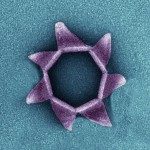Lien vers Pubmed [PMID] – 16197904
Med Sci (Paris) 2005 Oct;21(10):860-5
One of the most important outcomes of modern biology has been the demonstration of the unity of life. All living beings are in fact descendants of a unique ancestor commonly referred to as Luca (the Last universal common ancestor). The discovery – nearly 30 years ago by Carl Woese – that present-day life on our planet can be assigned to only three domains: two of prokaryotic nature (Archaea and Bacteria), and one eukaryoyic (Eucarya), has given birth to a new field of investigation aimed at determining the nature of Luca. Today, thanks to the accumulation of genomic data, we can loop back into the past and infer a few characters of Luca by comparing what present-day organisms have in common. For example, it is now clear that Luca was a cellular organism provided with a cytoplasmic membrane, and that it harboured already a quite sophisticated translation apparatus. However, the inference of other characters of Luca from comparative genomics is less straightforward: for instance, a few key molecular mechanisms for DNA replication are non-homologous across the three domains and their distribution is often puzzling. This evidence has been embraced by proponents of the hypothesis that Luca harboured an RNA genome and that its replacement by DNA and the appearance of the corresponding molecular systems would have occurred independently in the three life domains after their divergence. However, an equally likely scenario would be that of a Luca with a DNA genome and of a subsequent replacement of its DNA-replication systems by non-homologous counterparts either in the bacterial or in the archaeal/eukaroytic branch. Nevertheless, including the viral world into the picture of the tree of life may thus provide us with precious insights into our most distant past since the invention and spread potential of viruses may have played a key role in early evolution.

